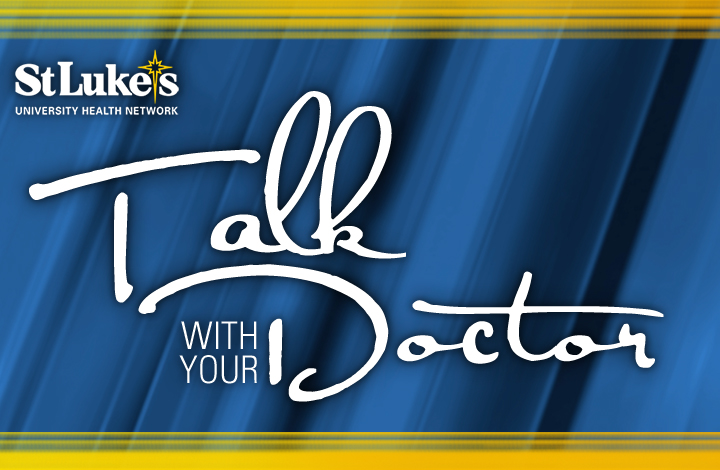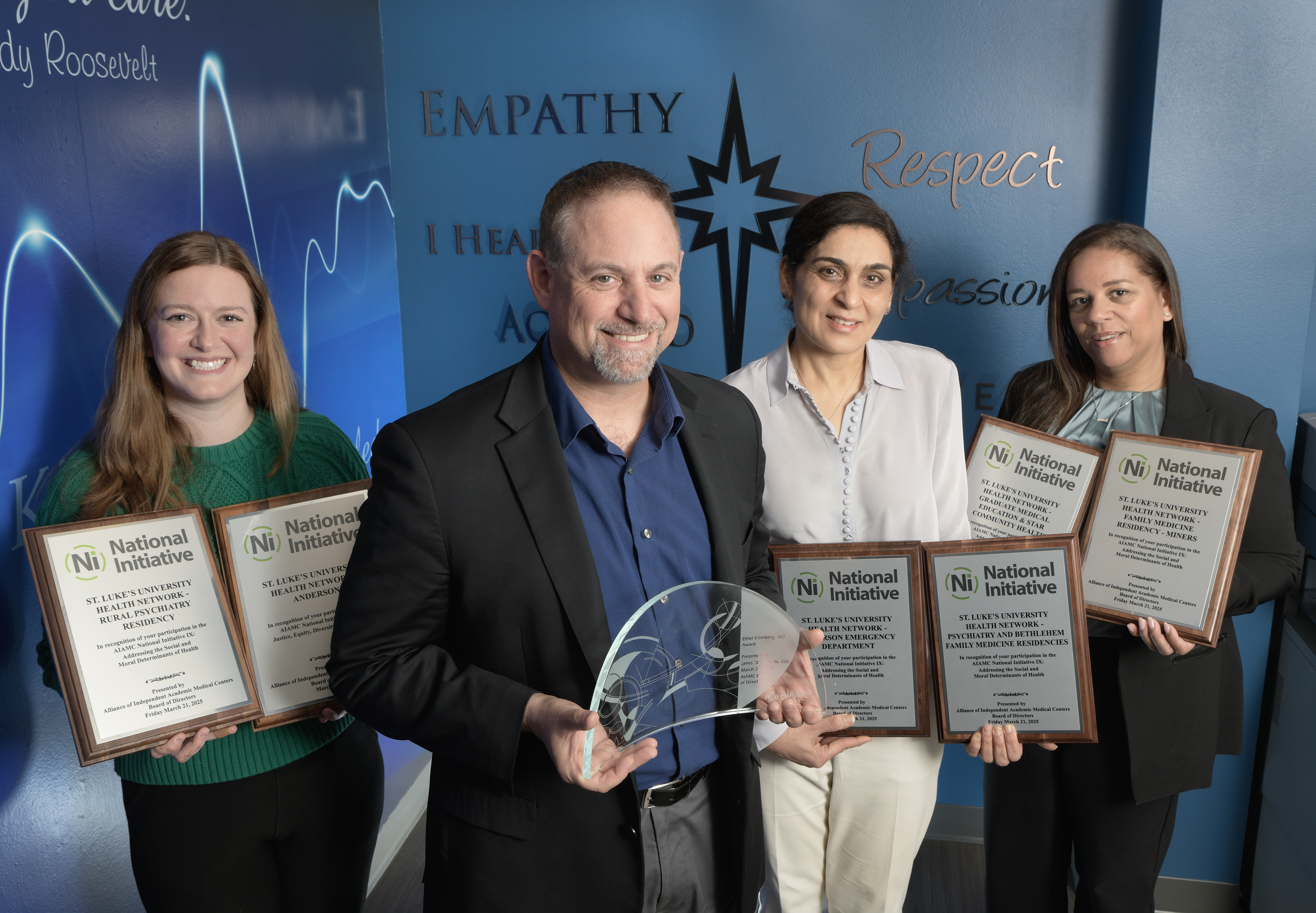Wearable Fitness Trackers Help Students Elevate Activity Levels
May 17, 2017

St. Luke’s Approach to Stroke Care Saves Precious Time and Brain
Wearable Fitness Trackers Help Students Elevate Activity Levels
A pair of pilot programs in area school districts are leveraging technology to promote exercise and healthy lifestyles in children.
Through the “St. Luke’s Community Health Elementary School Fitness Project,” third-graders in the Bethlehem Area School District (BASD) and sixth- through eighth-graders in the Phillipsburg (N.J.) School District have been given Sqord activity pods to wear day and night.
These wearable fitness trackers measure movement — not just steps — and convert it into points that connect to awards through an associated app.
“Kids today face an epidemic of preventable, lifestyle-related diseases that are often tied to lower levels of physical activity,” explains Todd Nemura, MS, Healthy Living Program Coordinator, Department of Community Health & Preventive Medicine at St. Luke's University Health Network.
“In fact, child health issues are in the top five of our findings when we looked at all the health issues facing the Lehigh Valley today. Lifestyle health, including fitness activity, was the number two issue Valley-wide. With the advent of wearable activity tracking and feedback devices like the Sqord, there is huge potential to use these technologies to improve health outcomes in both children and adults.”
The SLUHN innovation program — St. Luke’s Technology Ventures — got involved to fund the pilot.
“We provided the Sqord fitness trackers as well as supplied the schools with iPads they could use for the students to sync their devices and measure their activity levels,” explains Erin Quick, SLUHN Innovation Project Coordinator.
Kids participating in the program are wearing their Sqord for three months. Their teachers are promoting continued use and encouraging activity, which has been shown to be a major factor in kids staying interested and keeping the device on.
“At the end of the three months, we’ll have lots of activity data that can be analyzed,” Nemura says.
Although results are preliminary, students are showing high levels of activity, according to Sqord. In fact, one of the classes was ranked in the top five of more than 50 schools nationally. Both pilot programs will run through the end of the current school year. Other health systems such as Providence Health System, Christus Health, Hoag Health System and St. Jude’s Hospital have partnered with Sqord to help establish healthy habits and keep long term costs low.
In the Phillipsburg School District, 30 Sqord trackers have been distributed to supplement the fitness and nutritional education and work of Dr. Eugene Decker and his team through an after-school program called “Kids in Motion.” Dr. Decker’s program was set up to target students at risk of childhood obesity and is a larger fitness motivation program.
The Kids in Motion program is based out of the St. Luke’s Warren Health & Wellness Center in Phillipsburg, and started last November.
“The program involves kids from sixth through eighth grade in the Phillipsburg School District who have weight issues,” Dr. Decker notes. “I sent out invitations to over 75 kids and eventually started the program with 16.”
Program participants go to the Health and Wellness Center on Monday and Wednesday afternoons for an hour of exercise. “We have been tracking their activity through computer printouts during our program and have weighed the kids periodically to track their weight. I believe the Sqords have encouraged the kids to be active,” Dr. Decker explains.
Meanwhile, 150 third-graders and 20 teachers and administrative staff in the Bethlehem Area School District’s (BASD) Donegan and Marvine elementary schools received the fitness trackers. The program is run through the Department of Community Health & Preventive Medicine at St. Luke's.
In addition to the use of the fitness trackers, the BASD program features a field trip to a SLUHN fitness center where students will participate in fitness activities, receive t-shirts, eat a healthy lunch, and more.
“We will encourage the kids to continue using the device even after the school year is over,” Nemura says. “We expect many will stop doing so due to the teachers not being there to reinforce continued use.”
Data will still be collected from those students who continue to wear their fitness trackers after the school years and who participate in a summer camp.
“This will further help our main goal of the Sqord project, which is to determine how we can best use these devices to both increase activity and measure it,” Nemura notes. “Once the summer camp starts, we’ll have a small group of kids who are still wearing the devices, and we can then look at their activity levels during the summer camp and compare it to others who are wearing the device, but who are not participating in the summer camp.”
Nemura says this will allow the Community Health Department to look at a longer term for continued use of the devices, and will help it evaluate how the summer camp increases activity in the kids who participated.
The overarching hope is that exercise and healthy lifestyles become more prevalent among children in the Lehigh Valley.
Quick adds: “We aim to empower local students to remain active in school and at home to maintain a healthy lifestyle.”
About St. Luke’s
Founded in 1872, St. Luke’s University Health Network (SLUHN) is a non-profit, regional, fully integrated and nationally recognized network providing services at seven hospitals and more than 270 outpatient sites. The network’s service area includes Lehigh, Northampton, Carbon, Schuylkill, Bucks, Montgomery, Berks and Monroe counties in Pennsylvania and in Warren County in New Jersey. Dedicated to advancing health education, St. Luke’s operates the nation’s oldest School of Nursing and 22 graduate medical educational programs and is considered a major teaching hospital, the only one in the region. In partnership with Temple University, St. Luke’s created the region’s first Medical School. Repeatedly, including 2017, St. Luke’s has earned Truven’s 100 Top Major Teaching Hospital designation as well as 50 Top Cardiovascular program in addition to other honors for clinical excellence. St. Luke’s is a multi-year recipient of the Most Wired award recognizing the breadth of St. Luke’s information technology applications such as electronic medical records, telehealth, online scheduling and pricing information. St. Luke’s is also recognized as one of the state’s lowest cost providers in comparison to major teaching hospitals and other health systems.
Latest News


April 10, 2025
National Recognition for SLUHN Graduate Medical Education

April 09, 2025
In Safe Hands Award

April 08, 2025